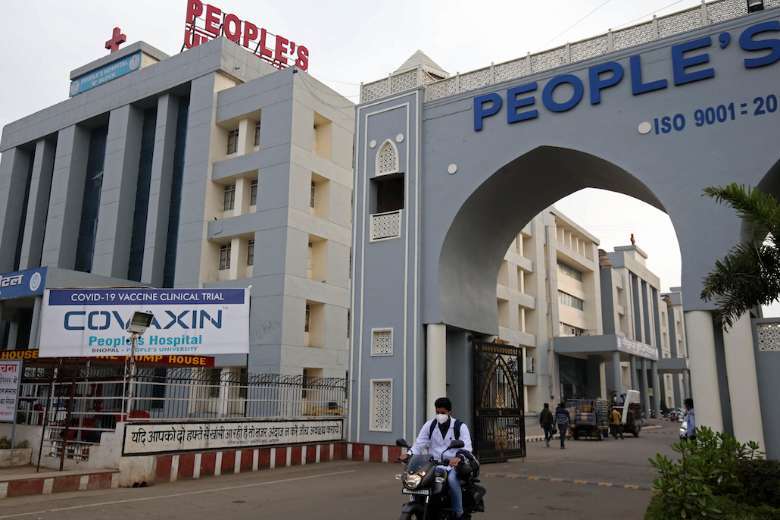Is rolling out the world’s largest vaccination program justified and why would the government drain the public coffers?

January 15, 2021

Vehicles move past the People’s University in Bhopal on Jan. 8. A homegrown coronavirus vaccine will be rolled out in India from Jan. 16 even though clinical trials have not been completed. (Photo: Gagan Nayar/AFP)
India is heading for a massive rollout of Covid-19 vaccination from Jan. 16. But the million-dollar question remains: will administering a vaccine in haste and just as a token do more damage than the pandemic itself?
The Drugs Controller General of India this month gave restricted emergency-use approval for vaccines from two private pharmaceutical companies — Serum Institute of India’s Covishield and Bharat Biotech’s Covaxin.
Covishield is the Indian name for the vaccine developed by Oxford University and AstraZeneca and produced by Serum Institute. Covaxin is a government-backed experimental vaccine.
Federal Health Minister Harsh Vardhan, a medical doctor, has assured the country of 1.3 billion people that glitch-free arrangements will be made to administer the vaccines, notwithstanding all the skepticism being spread by opposition parties and critics.
“India is well known for arranging glitch-free elections through booth-level management. The same experience of election management and of universal health immunization logistics will be used to deliver the first doses of Covid-19 vaccines to one crore (10 million) health workers and two crore (20 million) frontline workers,” Vardhan said.
Prime Minister Narendra Modi told a virtual meeting of provincial chief ministers that the federal government will bear the cost of vaccinating 30 million healthcare and frontline workers in the first phase of the vaccination drive against the novel coronavirus.
“We have given a special price of 200 rupees (US$2.73) for the first 100 million doses only to the government of India at their request,” said Adar Poonawalla, Serum Institute’s chief executive, according to a Reuters report. The vaccine will be sold for 1,000 rupees ($13) on the private market.
So far, India has recorded 10,528,508 Covid-19 cases with 151,954 deaths. The total number of recovered cases stands at 10,162,082.
When some 70 percent of Indian people live below the poverty line, living on less than $2 a day, how many can afford to spend $13 for vaccination?
Experts are actually not sure the vaccination will be the panacea that eliminates a pandemic that has claimed millions of lives worldwide. Skepticism abounds. Critics say the development of vaccines against flu has seen only partial success, so why so much hype?
“As far as common people’s perception about the pandemic is concerned, the fear is gone,” says Ratnadeep Gupta in Guwahati. “In eastern India and especially in smaller towns, life is slowly coming back to normal.”
People gave up face masks long back. Now, slowly, social distancing precautions are also vanishing. During the Bihar state election campaign last October, there was no fear of Covid-19 as political parties, including the ruling Bharatiya Janata Party (BJP), organized public rallies. The same political enthusiasm is visible in the poll-bound states of Assam and West Bengal, Gupta says.
In other words, is rolling out the world’s largest vaccination program a justifiable venture? Why would the government drain the public coffers? And, perhaps more importantly, why put the health of millions of Indians at risk as many are apprehensive about side effects? There are also concerns about allergic reactions, even anaphylaxis (life-threatening allergic reaction) deaths.
Moreover, will not pharma manufacturers exploit the situation to make money? The public has good reason to question whether the vaccines will be effective against the virus’s mutated versions. The answers to most of these questions remain typically: only in the fullness of time.
Political mudslinging has begun nevertheless.
“It is dangerous that Bharat Biotech’s vaccine (Covaxin) got approval for emergency use without due procedure. Doing vaccination in a hurry will be very dangerous. The clinical trial for Bharat Biotech’s vaccine is incomplete, but it got approval — it is dangerous,” said Communist Party of India (Marxist) general secretary Sitaram Yechury.
Socialist leader Akhilesh Yadav, a former chief minister of the country’s largest state, Uttar Pradesh, has said that he will not get vaccinated against coronavirus because the BJP government “cannot be trusted.”
Opposition Congress lawmaker Manish Tewari spoke in a similar vein. “The government has politically misused the Covid-19 pandemic in its entirety. The controversy over the vaccine is its latest manifestation. Who is going to get himself vaccinated with a vaccine that has question marks over its reliability?”
The ruling party, however, is unmoved. PM Modi’s one-time health minister and now BJP national chief, J.P. Nadda, has said: “To further their own failed politics and nefarious agendas, Congress and other opposition leaders are trying to cause panic in the minds of the people. I urge them to do politics on other issues. They should avoid playing with people’s precious lives and hard-earned livelihoods.”
Interestingly, the Congress party had earlier slammed the Modi government for being “tardy” in rolling out the vaccination against India’s unseen virus.
Late last month, Congress leader Rahul Gandhi said that 2.3 million people in the world have already received vaccinations. “China, the US, UK, Russia have started … When will India get its turn, Mr. Modi?”
The opposition parties have their reasons to scream that the coronavirus crisis has actually come as a blessing in disguise for the government as the Modi administration failed to generate jobs in its first tenure between 2014 and 2019.
The economy has taken a beating for various reasons, including the ill-timed demonetization of a high-value rupee in 2016.
Now, Modi has a good excuse called Covid-19, and the virus has not harmed his political future. The victims in all these games are always the Indian poor.
The views expressed in this article are those of the author and do not necessarily reflect the official editorial position of UCA News.
